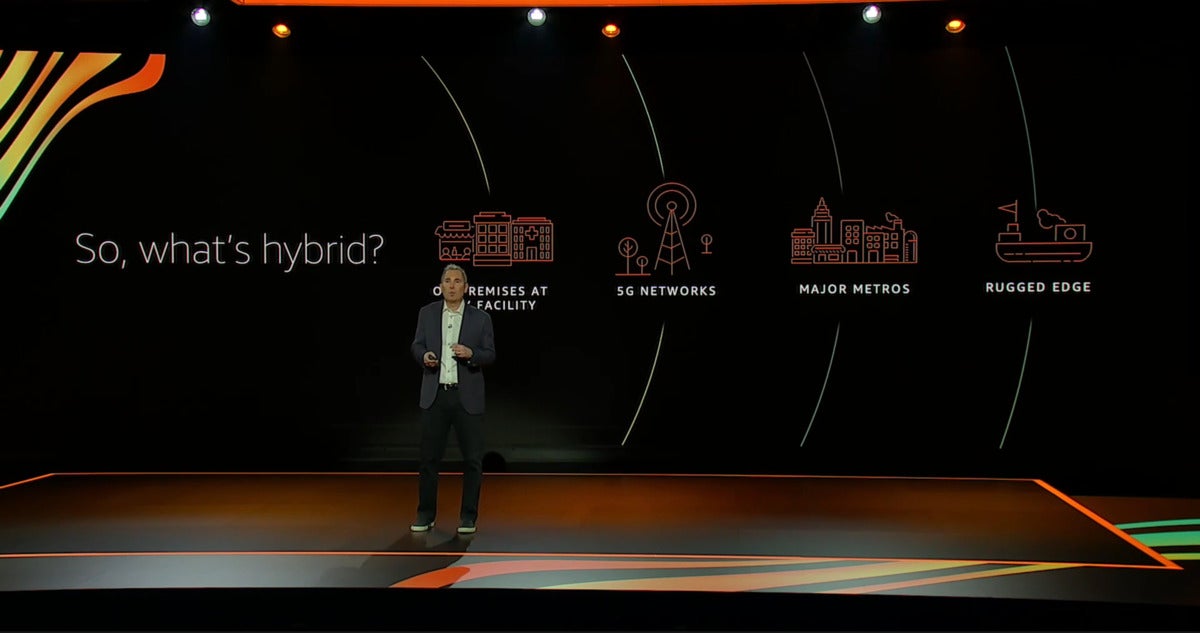Amazon Web Services made a set of announcements during the first day of its AWS re:Invent conference this week aimed at helping customers ease the deployment and management of container-based and serverless applications both on premises and in the AWS cloud, but stopped short of explicitly making it easier to run alongside rival clouds.
In this respect there were three major announcements from AWS CEO Andy Jassy’s virtual re:Invent keynote on Tuesday, December 1. The first two, Amazon EKS Anywhere and Amazon ECS Anywhere, are aimed at helping customers run containerized workloads seamlessly on premises and in the cloud.
Amazon Elastic Kubernetes Service (EKS) is a managed Kubernetes service that uses the popular open source container orchestrator. Elastic Container Service (ECS) is a more proprietary, AWS-centric option for running containers.
Jassy acknowledged that customers often use different flavors of these managed container services for different workloads and in different teams depending on their skill sets and unique requirements.
With the Anywhere options, AWS is looking to make it easier to run EKS and ECS both on premises and in the cloud, while alleviating common management headaches by allowing developers to use the same APIs and cluster configurations for both types of workloads.
Amazon's EKS Distro (EKS-D) is also being open sourced, allowing developers to maintain consistent Kubernetes deployments across environments, including bare metal and VMs. "We’ve learned that customers want a consistent experience on-premises and in the cloud for migration purposes or to enable hybrid cloud setups," a blog post by Michael Hausenblas and Micah Hausler from AWS said.
The third announcement in this space was the public preview of AWS Proton, a new service that allows developer teams to manage AWS infrastructure provisioning and code deployments for both serverless and container-based applications using a set of templates.
These centrally managed templates will define and configure everything from cloud resources to the CI/CD pipeline for testing and deployment, with observability on top. Developers can choose from a set of Proton templates for simple deployment, with monitoring and alerts built-in. Proton also identifies downstream dependencies to alert the relevant teams of changes, upgrade requirements, and rollbacks. Proton will support on-premises workloads through EKS Anywhere and ECS Anywhere as they come online for customers.
Hybrid, not multicloud
Towards the end of his keynote Jassy reiterated his view that most companies will eventually run predominantly in the cloud, but it will take time to get there. Hence the need for hybrid capabilities—such as AWS Outposts, EKS and ECS Anywhere, and AWS Direct Connect—as a necessary on-ramp for enterprise customers.
“We think of hybrid infrastructure as including the cloud alongside other edge nodes, including on-premises data centers. Customers want the same APIs, control plane, tools, and hardware they are used to using in AWS regions. Effectively they want us to distribute AWS to these various edge nodes,” Jassy said.
Many enterprise customers want to run different workloads with multiple cloud providers depending on their specific needs. Further, many of these customers want to avoid becoming too dependent on any one cloud. For example, 37% of respondents to the IDG Cloud Computing Survey this year cited the desire to avoid vendor lock-in as one of their primary goals.
Ahead of the event it was rumored that AWS would go further in launching a broader multicloud management option which would allow customers to manage Kubernetes workloads running on rival Google Cloud Platform and Microsoft Azure cloud infrastructure, much like Google Cloud is trying to do with Anthos and Microsoft with Azure Arc, or IBM’s suite of options via its newly acquired Red Hat assets.
This didn’t happen on day one of re:Invent.
“With the notable exception of fully embracing multicloud services, AWS is gradually becoming more flexible in supporting a wider range of customer requirements,” Nick McQuire, senior vice president at CCS Insight said after the keynote.
That doesn’t mean EKS couldn’t be used to traverse various environments. As InfoWorld contributor and AWS employee Matt Asay tweeted, “Could you run EKS Distro on another cloud? Yep.”
“Customers will be able to run EKS Anywhere on any customer-managed infrastructure. We are still working on the specific infrastructure types that we will support at GA,” Deepak Singh, AWS VP of compute services, told InfoWorld.
Other major announcements
Over the three hours of Jassy’s keynote there were many other announcements, including those around databases, which also focused on customers’ desires for portability. AWS Glue Elastic Views was announced as a means for simple data replication across various data stores, while the open source Babelfish for Aurora PostgreSQL offers a way to run SQL Server applications on Aurora PostgreSQL.
The machine learning platform Amazon SageMaker was enhanced with a new automated data wrangler feature and a feature store to make it easier to store and reuse features. Amazon SageMaker Pipelines was announced as a CI/CD solution for machine learning pipelines.
Jassy also spent a lot of time focusing on the vendor’s continued work around more price performant custom silicon. He first reflected on the success of its Graviton2 and Inferentia chips announced last year, the latter of which are optimized for machine learning workloads and now run most of the company’s Alexa workloads.
This year focused on price performance for machine learning workloads, with the announcement of Habana Gaudi-based EC2 instances, offering more economically viable processors for machine learning workloads and AWS Trainium as a cost-effective option for machine learning model training.
Day one down, just 20 left to go.






